
Introduction
Computing has become an indispensable skill today both locally and globally. However, it is a rapidly expanding subject area that interacts with numerous other disciplines by exposing it to a range of interesting and raising challenging problems. To solve these problems, one needs to have a firm grasp of the fundamental concepts of Computer Science as well as in-depth knowledge of specific areas of Computer Science such as Artificial Intelligence, Machine Learning, Big Data Analytics, Robotics, Cloud Computing, High Performance Computing, Computer Security, Software Engineering, Net-centric Computing, Visual Computing, Multimedia Technologies, Mobile and Web Computing, etc. are needed. This program has been designed to address the aforementioned requirements by developing the necessary skills of students to develop innovative solutions to emerging complex problems.
Target Group
- Those who are planning to start their career or already employed in the field of computing.
- Those who need postgraduate qualifications in Computer Science or those who are pursuing qualifications to do higher studies in computing and related disciplines.
- Those who teach Computing disciplines in universities, other higher educational institutes, or schools.
Minimum Admission Requirement
- A Bachelor’s Degree in Computer Science, Computer Engineering, Software Engineering, Information Technology, Information and Communication Technology, Information Systems, Physical Sciences or Engineering from a recognized university, or
- Any other degree with 30 credits in Computing from a recognized university, or
- Any other equivalent qualification in Computing that would be acceptable to the Faculty of Graduate Studies (FGS) and the senate of the university.
Student Intake
Maximum of 50 students per batch. However, the program will be started only if at least 25 candidates are registered.
Selection Procedure
A written examination and/or an interview will be held to select candidates when the number of applicants exceeds the maximum number that can be accommodated.
Program Duration
- M.Sc. in Computer Science – 2 years (4 semesters)
- Master of Computer Science – 1 year (2 semesters)
- Postgraduate Diploma / Certificate in Computer Science – 1 year (2 semesters)
The program is divided into 4 semesters. Semester l consists of core course units worth 15 credits. Semester 2 consists of core and optional course units. Only those who are leaving with a Master of Computer Science degree at the end of the first year need to complete the independent study in the second semester. In semesters 3 and 4, candidates who are eligible to do the thesis can engage in individual research and submit a thesis. Lectures and practical sessions are conducted on Saturdays and Sundays from 8.00 am to 5.00 pm. In addition to that, candidates must be able to spend a considerable amount of time on self-studies, homework, assignments, etc., throughout the program. This program is primarily a two-year M.Sc. program with course work and research (SLQF level 10). All candidates are recruited as M.Sc. candidates, and they are required to follow the course units offered in the first and second semesters.
Course Structure
The course units offered for the M.Sc. program in Computer Science are given in Table 1. However, the course units given in the list could be replaced by other suitable course units without prior notice with the intention of improving the program and/or depending on the availability of the lecturers.
Table 1: Course Units
| Course Code |
Course Title
|
Course Type |
Credit Value |
| Semester 1 |
| CSC 501 0.0 |
Mathematics for Computing |
f |
0.0 |
| CSC 502 0.0 |
Statistics for Computing |
f |
0.0 |
| CSC 506 1.0 |
Computer Programming Laboratory |
c |
1.0 |
| CSC 512 2.0 |
Data Structures and Algorithms |
c |
2.0 |
| CSC 518 2.0 |
Operating Systems |
c |
2.0 |
| CSC 540 2.0 |
Software Engineering |
c |
2.0 |
| CSC 541 2.0 |
Computer System Architecture |
c |
2.0 |
| CSC 542 2.0 |
Database Systems and Administration |
c |
2.0 |
| CSC 543 2.0 |
Data Communication and Networking |
c |
2.0 |
| CSC 544 2.0 |
Mobile and Web Computing |
c |
2.0 |
| Semester 2 |
| CSC 505 3.0 |
Computer Programming |
c |
3.0 |
| CSC 527 2.0 |
Net Centric Computing |
o |
2.0 |
| CSC 529 2.0 |
Computer and Network Security |
c |
2.0 |
| CSC 532 2.0 |
Human Robot Interaction |
o |
2.0 |
| CSC 550 5.0 |
Independent Study* |
o |
2.0 |
| CSC 551 2.0 |
Computer Graphics and Image Processing |
o |
2.0 |
| CSC 552 2.0 |
Software Quality Assurance and Project Management |
o |
2.0 |
| CSC 553 2.0 |
Theory of Programming Languages |
o |
2.0 |
| CSC 614 2.0 |
Research Methodologies and Scientific Writing |
o |
2.0 |
| CSC 602 2.0 |
Artificial Intelligence |
o |
2.0 |
| CSC 610 2.0 |
Machine Learning |
o |
2.0 |
| Semester 3 |
| CSC 603 2.0 |
Nature Inspired Algorithms |
o |
2.0 |
| CSC 611 2.0 |
Embedded Systems and IoT |
o |
2.0 |
| CSC 612 2.0 |
Natural Language Processing |
o |
2.0 |
| CSC 618 2.0 |
High Performance Computing and Big Data Analytic |
o |
2.0 |
| CSC 619 2.0 |
Computational Biology |
o |
2.0 |
| CSC 620 2.0 |
Miscellaneous Topics in Computing Science |
o |
2.0 |
| CSC 621 2.0 |
Planning and Optimization |
o |
2.0 |
| CSC 622 2.0 |
Data Science and Business Intelligence |
o |
2.0 |
| CSC 623 2.0 |
Cloud Computing and Virtualization |
o |
2.0 |
| CSC 624 2.0 |
Robotics and Automation |
o |
2.0 |
| CSC 625 2.0 |
Service Oriented Computing |
o |
2.0 |
| Semester 3 & 4 |
| CSC 650 20.0 |
M.Sc Thesis |
c |
2.0 |
Table 2: Grading Point System
Table 2: Grade Point System
| Grade |
Grade Point (GP) |
Interpretation |
| A+ |
4.0 |
Outstanding |
| A |
4.0 |
Excellent |
| A- |
3.7 |
Excellent |
| B+ |
3.3 |
Very Good |
| B |
3.0 |
Good |
| B- |
2.7 |
Good |
| C+ |
2.3 |
Fair |
| C |
2.0 |
Sufficient |
| C- |
1.7 |
Insufficient |
| D+ |
1.3 |
Unsatisfactory |
| D |
1.0 |
Poor |
| E |
0.0 |
Very Poor |
| ab |
0.0 |
Absent |
| M |
0.0 |
Absent on medical reasons |
- Methods of continuous assessments:
Students will be assessed during the program through written examinations, quizzes, assignments, viva voce examination, practical and tutorials as appropriate.
- Eligibility requirement for an examination of a course unit:
A student will be eligible to sit the end of semester examination of a course unit if she has maintained a minimum of 60% attendance at lectures/practical of the course unit. Any student who fails to fulfil the eligibility requirement for any course unit will be allowed to sit the examination of the course unit but the maximum grade he/she can earn for that course unit shall be restricted to ‘C+’.
- Valid reasons for absence from an examination of a course unit:
The excuse may be granted only for seriously ill health or death of an immediate family member or any other cause acceptable to the Faculty of Graduate Studies (FGS) subsequently approved by the university senate. A candidate who is absent due to medical reasons shall submit a medical certificate from a registered medical officer within two weeks from the date of the examination. He/She may sit the examination with the next batch, and he/she is considered as a first-time candidate. However, if the course unit is not available in the current M.Sc. program, the candidate must sit the examination of an alternative course unit offered in the respective semester of the current academic year.
- Carrying forward continuous assessment marks:
In case of a repeated candidate or an absentee of a course unit, marks obtained for the continuous evaluation of that course unit shall be carried forward for the next examination if the lecturer-in-charge of the course unit is agreed.
- Duration of a written/practical examination:
Duration of an end of semester written/practical examination can vary depending on the requirements of each course unit.
- Calculating the GPA of course units:
The GPA of course units is calculated as follows:

Where GPi and Ci are grade point and the credit value of the ith course unit respectively. The GPA shall be rounded to the second decimal place. If a student has taken more than the required number of credits for a certain completion point, only the highest graded course units will be taken to calculate the GPA.
- Completion of a course unit:
A candidate needs a minimum of ‘C’ grade to pass the examination of a course unit. Those who do not meet the above criterion may repeat the final examination of the course unit and maximum grade in such an attempt shall be limited to the grade ‘B’.
- Independent Study:
At the end of the second semester, those candidates who obtain a GPA not less than 2.70 are eligible to do the independent study and submit a thesis only if they wish to exit with a Master of Computer Science degree. If a student doesn’t have the required minimum GPA to do the independent study, the Department may allow him/her to continue the independent study under the condition of fulfilling the required qualifications (GPA excluding the independent study) before the graduation. However, it is the student’s responsibility to provide a suitable independent study topic before the beginning of the second semester. Students should discuss with academics in any university or qualified personnel in the industry to choose a research topic. The independent study will be evaluated on the basis of a written thesis and an oral presentation (viva-voce examination). The examination panel consists of supervisor(s) of the independent study and two other examiners as recommended by the Board of Study in Physical Sciences and approved by the Senate of the University of Sri Jayewardenepura. Those who are taking independent study are required to take course units worth 10 credits from the second semester.
- M.Sc.. thesis:
At the end of the second semester, those candidates who obtain a GPA not less than 2.70 are eligible to do a research project and submit an M.Sc. thesis based on the research project. If a student doesn’t have the required minimum GPA to do the research project, the Department may allow him/her to continue the research under the condition of fulfilling the required qualifications (GPA excluding the research project) before the graduation. However, it is the student’s responsibility to provide a suitable research topic before the beginning of the third semester. Students should discuss with academics in any university or qualified personnel in the industry to choose a research topic. The research project will be evaluated on the basis of a written M.Sc. thesis and an oral presentation (viva-voce examination). The examination panel consists of supervisor(s) of the research project and two other examiners as recommended by the Board of Study in Physical Sciences and approved by the Senate of the University of Sri Jayewardenepura. Those who are taking M.Sc. thesis are required to take course units worth 10 credits from the third semester.
- Completion of the M.Sc. in Computer Science Degree:
To award the M.Sc. in Computer Science Degree, a candidate should obtain:
(a) A GPA of not less than 2.70 for 40 credits (that should include 30 credits from the first two semesters and 10 credits from the third semester) at the end of the third semester of the program
and
(b)A ‘C’ or higher grade for the M.Sc. thesis
and
(c)`C’ or higher grades for all the foundation course units.
- Completion of the Master of Computer Science Degree:
To award the Master of Computer Science degree, a candidate should obtain:
(a) A GPA of not less than 2.70 for 25 credits (excluding the independent study) at the end of the second semester of the program
and
(b) A ‘C’ or higher grade for the independent study thesis and
(c) `C’ or higher grades for all the foundation course units.
- Completion of the Postgraduate Diploma in Computer Science:
To award the Postgraduate Diploma in Computer Science, a candidate should obtain:
(a) A GPA of not less than 2.50 for 25 credits (that should include 15 credits from the first semester and 10 credits from the second semester excluding the independent study) at the end of the second semester of the program
and
(b) `C’ or higher grades for all the foundation course units.
- Completion of the Postgraduate Certificate in Computer Science:
To award the Postgraduate Certificate in Computer Science, a candidate should obtain:
(a) A GPA of not less than 2.00 for 20 credits (that should include 15 credits from the first semester and 05 credits from the second semester excluding the independent study) at the end of the second semester of the program
and
(b) `C’ or higher grades for all the foundation course units.
- Exit points:
The following exit points are offered to a candidate of the program:
(a) A candidate who fulfils the requirement given in Assessment process – 13 has the option of exiting at the postgraduate certificate level and obtaining the Postgraduate Certificate in Computer Science [SLQF 7].
(b) A candidate who fulfils the requirement given in Assessment process – 12 has the option of exiting at the postgraduate diploma level and obtaining the Postgraduate Diploma in Computer Science [SLQF 8].
(c) A candidate who fulfils the requirement given in Assessment process – 11 has the option of exiting at the master’s by course work level and obtaining the Master of Computer Science [SLQF 9].
(d) A candidate who fulfils the requirement given in Assessment process – 10 has the option of exiting at the M.Sc. by course work and research level and obtaining the M.Sc. in Computer Science [SLQF 10].
Note: However, no candidate is allowed to obtain more than one certificate from the above exit points of the M.Sc. in Computer Science program from the University of Sri Jayewardenepura.
- Merit pass:
(a) Merit Pass in M.Sc. in Computer Science:
Those who obtain a GPA of not less than 3.60 for 40 credits (that should include 30 credits from the first two semesters and 10 credits from the third semester excluding the research project) at the end of the third semester of the program and obtain an ‘A-‘ or higher grade for the thesis will be awarded a merit pass.
(b) Merit Pass in Master of Computer Science:
Those who obtain a GPA of not less than 3.60 for 25 credits (excluding the independent study) at the end of the second semester of the program and obtain an ‘A-‘ or higher grade for the independent study will be awarded a merit pass.
- Repeating a course unit:
A candidate is allowed to repeat a course unit only two times. A separate repeat examination will not be held under any circumstance. The maximum grade that could be obtained for a repeated course unit is restricted to ‘B’. If a student obtains a lower grade at a repeat attempt than the grade received in an earlier attempt, the better will be used to compute the GPA. However, if the course unit is not available in the current M.Sc. program, the candidate must sit the examination of an alternative course unit offered in the respective semester of the current M.Sc. program and the maximum grade that could be obtained for this alternative course unit is also restricted to ‘B’. However, the candidates need to pay a repeat examination fee decided by the Board of Study in Physical Sciences of the Faculty of Graduate Studies (FGS).
- Effective dates of certificates:
(1) M.Sc. in Computer Science:
The latest date of either the submission of the M.Sc. thesis or the completion of examinations shall be considered as the effective date. In the case of a thesis with major corrections, the effective date shall be the date of submission of the revised thesis subject to the acceptance of the panel of examiners. In the case of completion of examinations, the day following the last examination of the respective semester (the last examination the candidate has sat including the repeat examinations) shall be considered as the effective date.
(2) Master of Computer Science:
The latest date of either the submission of the independent study thesis or the completion of examinations shall be considered as the effective date. In the case of an independent study thesis with major corrections, the effective date shall be the date of submission of the revised thesis subject to the acceptance of the panel of examiners. In the case of completion of examinations, the day following the last examination of the respective semester (the last examination the candidate has sat including the repeat examinations) shall be considered as the effective date.
(3) Postgraduate Diploma/Certificate in Computer Science:
The day following the last examination of the respective semester the candidate has sat (including the repeat examinations) shall be considered as the effective date.
Note:
A candidate who takes a repeat examination (subsequent to submitting of thesis), the effective date shall be the day following the last examination of the respective semester.
Important Notes:
1. The program will be started only if at least 25 candidates are registered.
2. Students are not allowed to sit for lectures or examinations if they have not paid the required fees on time.
3. A candidate is only eligible to receive Postgraduate Certificate or Postgraduate Diploma or Master degree or M.Sc. degree. A candidate can receive only one certificate of these qualifications.
(1) Course fee for M.Sc. degree (local candidates) – Rs. 490,000/-
(2) Course fee for foreign candidates
- SAARC countries – US$ 3,000/-
- Non-SAARC countries – US$ 5,500/-
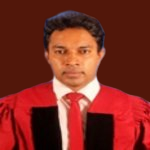 |
Dr. T.M.K.K. Jinasena (Coordinator )
BIT (Hons)(Colombo, Sri Lanka), B.Sc. (Comp. Sci.)(USJ, Sri Lanka), M.Sc.Sci.)(Colombo, Sri Lanka), Ph.D. (Comp. Sci.)(USJ, Sri Lanka)
Senior Lecturer in Computer Science
Department of Computer Science
University of Sri Jayewardenepura
Research interests: Computer Security, Data Mining
Email: kasun(at)sjp.ac.lk |
| a |
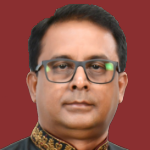 |
Prof.T.G.I. Fernando
B.Sc.(Hons)(Math)(USJ, Sri Lanka), M.Sc. (Industrial Mathematics)(USJ, Sri Lanka), M.Sc. (Comp. Sci.)(AIT, Thailand), Ph.D. (Inteligent Systems)(Brunel, UK)
Fields of Interest: Intelligent Systems, Evolutionary Computing, Swarm Intelligence, Neural Networks (including deep learning neural networks), Machine Learning and Multi-objective Combinatorial Optimization
Email: tgi(at)sjp.ac.lk, tgi.fernando(at)gmail.com
Tel: +94 11 275 8911, 94 11 280 3978
Web: http://staff.cs.sjp.ac.lk/tgi/, http://tgifernando.wordpress.com/ |
| a |
a |
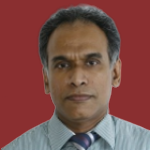 |
Prof. R.G.N. Meegama
B.Sc.(Hons)(Comp. Sci.) (UOC, Sri Lanka), M.Sc. (Comp. Sci.)(AIT, Thailand), Ph.D. (Comp. Sci.)(NTU, Singapore)
Fields of interest: Computer Graphics, Image Processing, Computer Networks,
Email: rgn(at)sci.sjp.ac.lk
Tel: +94 11 275 8912
Web: http://www.sci.sjp.ac.lk/rgn |
| a |
a |
 |
Prof.Prasad M.Jayaweera
B.Sc.(Hons)(Comp. Sci.) (UOC, Sri Lanka), Ph.L. and Ph.D. (Stockholm)
Fields of Interest: Information Systems Engineering, Standards and eCommerce Systems Designing, Motivation/Service/Process and Conceptual Modeling
Email: pja(at)sjp.ac.lk
Tel: +94 11 275 8909
Web: prasadjayaweera.pbworks.com
|
| a |
 |
Mr. P. Dias
B.Sc.(Math)(USJ, Sri Lanka), Dip.(Stat.)(Colombo), M.Sc.(Stat.)(Aus)
Senior Lecturer in Statistics
Department of Statistics
University of Sri Jayewardenepura
Research interests: Applied Statistics, Teaching and Learning
Email: dias@sjp.ac.lk |
| a |
 |
Dr. P. Ravindra S. De Silva (Head Department of Computer Science)
B.Sc.(Hons)(Comp&Stat)(UOC, Sri Lanka), M.Sc (Aizu, Japan), Ph.D (Aizu, Japan)
Fields of Interest: Social Robotics, Human-Robot Interactions (HRI), Affective Computing & User Modeling, Interactive media and technology, Human-centered robotic platform
Email: ravi@sjp.ac.lk
Tel: +94 11 275 8918
Web: www.ravindra-desilva.com |
| a |
 |
Dr. E. A. T. A. Edirisuriya
B.Sc.(Hons)(Math)(USJ, Sri Lanka), Postgraduate Dip.(Stat.)(UOC, Sri Lanka), M.Sc. (Comp. Sci.)(China), Ph.D. (Comp. Sci.)(Sweden)
Fields of Interest: Business Models, Goal Models, Process Models
Email: anandaed@sjp.ac.lk
Tel: +94 11 275 8908
|
| a |
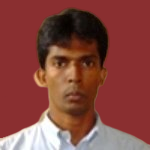 |
Mr. D. D. A. Gamini
B.Sc.(Hons)(Math)(USJ, Sri Lanka), M.Sc.(Comp. Sci.)(AIT, Thailand)
Fields of Interest: Artificial Intelligence and Theoretical Computer Science
Email: gamini(at)sjp.ac.lk
Tel: +94 11 275 8913, +94 11 280 3978 |
| a |
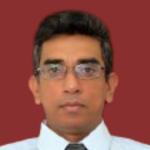 |
Dr. Chitraka Wickramarachchi
B.Sc. Special (Stat.) (USJ, Sri Lanka), M.Sc. (App. Stat.) (SL). M.Phil. (Stat.) (SL) PhD (NZ)
Senior Lecturer in Statistics
Department of Statistics
University of Sri Jayewardenepura
Research interests: Data Mining, Decision Tree Construction Algorithms, Applied Statistics.
Email: chitraka@sjp.ac.lk |
| a |
a |
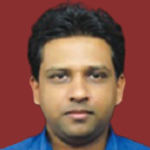 |
Dr. N.C. Ganegoda
B.Sc. (Mathematics)(USJ, Sri Lanka)(Sri Lanka), Ph.D.(Mathematics)(USJ, Sri Lanka)(Sri Lanka)
Senior Lecturer in Mathematics
Department of Mathematics
University of Sri Jayewardenepura
Research interests: Mathematical Modeling
Email: naleencg@gmail.com |
| a |
a |
 |
Ms. G.S. Makalanda
B.Sc.(Math)(USJ, Sri Lanka), M.Sc.(Stat)(USJ, Sri Lanka), M.Sc.(Comp. Sci.)(UK)
Email: |
| a |
a |
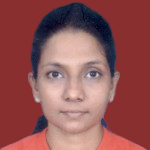 |
Ms. M. D.R.L. Silva
B.Sc.(Hons)(Comp. Sci.)(USJ, Sri Lanka), M.Phil. (Comp. Sci.)(UOM, Sri Lanka)
Fields of Interest: Bioinformatics and Computational Biology
Email: rangika@sjp.ac.lk |
| a |
a |
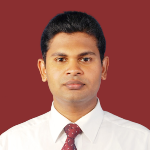 |
Mr. M. D. R. Perera
B.Sc. (Comp. Sci.)(USJ, Sri Lanka), M.Phil. (Comp. Sci.)(USJ, Sri Lanka)
Department of Computer Science
University of Sri Jayewardenepura
Research interests: Embedded Systems and IOT
Email: dilum@sjp.ac.lk
|
| a |
a |
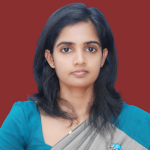 |
Dr. M.K.A. Ariyaratne
B.Sc.(Comp. Sci.)(USJ, Sri Lanka), Ph.D. (Comp. Sci.)(USJ, Sri Lanka)
Senior Lecturer in Computer Science
Department of Computer Science
University of Sri Jayewardenepura
Research interests: Computer Security, Intelligent Systems, Evolutionary
Computing, Swarm Intelligence, Neural Networks, Machine Learning
Email: mkanuradha@sjp.ac.lk |
| a |
a |
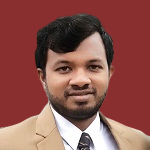 |
Dr. Ravimal Bandara
B.Sc.(Comp. Sci.)(USJ, Sri Lanka), Ph.D. (UOM, Sri Lanka)
Senior Lecturer (Probationary) in Computer Science
Department of Computer Science
University of Sri Jayewardenepura
Research interests: Machine Vision, Signal Processing and Multimedia Technologies
Email: ravimal@sjp.ac.lk |
| a |
a |
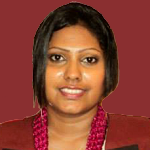 |
Ms. Umanda Dikwatta
B.Sc.(Comp. Sci.)(USJ, Sri Lanka), M.Sc. (Comp. Sci.)(UOM, Sri Lanka)
Lecturer (Probationary) in Computer Science
Department of Computer Science
University of Sri Jayewardenepura
Fields of Interest: Software Engineering, UI/UX, Web Archiving
Email: umanda@sjp.ac.lk
|
Academic support staff
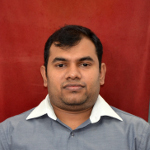 |
Mr. D. A. P. Peiris
B.Sc.(USJ, Sri Lanka), M.Sc. (Comp. Sci.)(USJ, Sri Lanka)
(Instructor – Computer Technology)
Department of Computer Science
University of Sri Jayewardenepura
Email: asanka(at)sci.sjp.ac.lk |
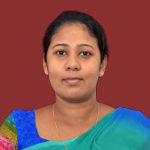 |
Ms M.C.Weerawardana
B.Sc.(Special) (Kelaniya, Sri Lanka) (Instructor – Computer Technology)
Department of Computer Science
University of Sri Jayewardenepura
Email: chandrani(at)dscs.sjp.ac.lk |
In addition, library fee, examination fee and registration fee should be payable at the time of registration.
Note: Students are not allowed to attend lectures or sit examinations if the payments were not made on time. Those who haven’t paid will not be considered as postgraduate students of the University of Sri Jayewardenepura.
Register for 2022/23
To register, please visit: https://applyfgs.sjp.ac.lk/online_applicationmaster/
Enquiries
Please contact: Faculty of Graduate Studies
Coordinator
Dr. T.M.K.K. Jinasena (Coordinator )
BIT (Hons)(Colombo, Sri Lanka), B.Sc. (Comp. Sci.)(USJ, Sri Lanka), ( M.Sc.Sci.)(Colombo, Sri Lanka),
Ph.D. (Comp. Sci.)(USJ, Sri Lanka)
Senior Lecturer in Computer Science
Department of Computer Science
University of Sri Jayewardenepura
Research interests: Computer Security, Data Mining
Email: kasun@sjp.ac.lk
Email: gamini@dscs.sjp.ac.lk
Office
Secretarial Assistant – M.Sc. in Computer Science Program
Department of Computer Science,




















